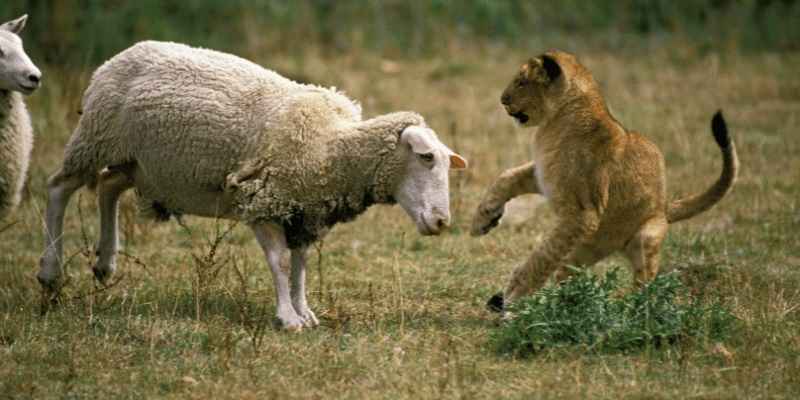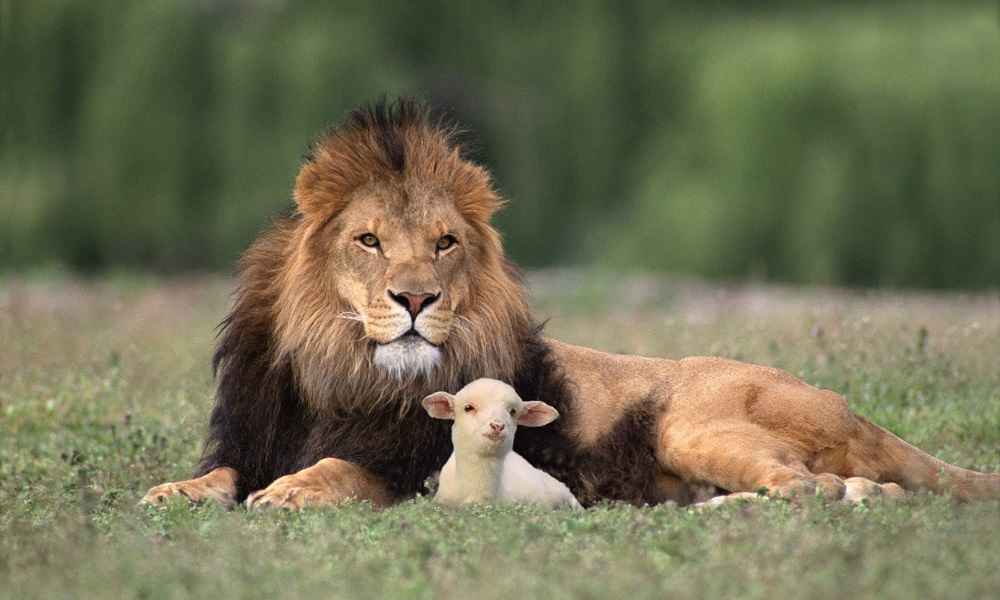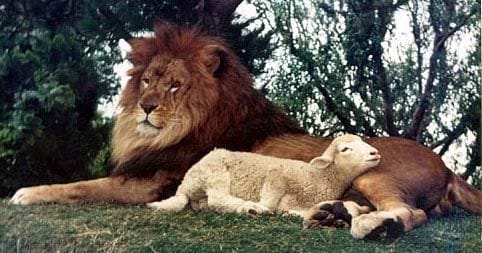Lions are carnivores and typically eat large mammals such as zebras, wildebeest, and buffalo. However, they have been known to prey on domestic animals like sheep in areas where wild prey is scarce.
Lions, the majestic big cats of the African savannah, are known for their powerful roar and fierce hunting abilities. However, in some areas, these apex predators have been observed preying on domestic animals such as sheep, causing conflict between local communities and conservation efforts.
This article aims to provide a detailed and comprehensive understanding of the phenomenon of lions eating sheep and its impact on local communities and ecosystems.

Lion Diet and Hunting Behavior
Lions are carnivores and typically prey on large mammals such as zebras, wildebeest, and buffalo. In the wild, lions hunt in groups, or prides, with the females doing most of the hunting.
They use their powerful bodies and sharp claws to take down their prey. However, in areas where wild prey is scarce, lions have been known to resort to preying on domestic animals such as sheep, goats, and cattle.
This behavior is often seen in areas where human populations have expanded and wild habitats have been destroyed, leaving lions with limited options for food. In addition, as lions are apex predators, they are not natural prey, so they may view domestic animals as easy targets.

Impact on Local Communities and Ecosystems
The predation of lions on domestic animals can have a significant impact on local communities, who rely on their livestock for food and income. In some areas, the loss of sheep and goats to lion attacks can lead to economic hardship for families. This can lead to retaliatory killing of lions, which can further threaten their population numbers.
From an ecological perspective, the predation of lions on sheep can also have a negative impact on the ecosystem. Sheep are often not native to the areas where they are raised, and their overpopulation can lead to overgrazing and degradation of the ecosystem.
However, it’s important to notice that lions are an essential part of the ecosystem and their presence is critical for maintaining balance in nature.
Possible Solutions and Conservation Efforts
To mitigate the conflict between lions and sheep, several conservation efforts have been implemented. These include:
Wildlife corridors: Wildlife corridors are areas of land that connect fragmented habitats, allowing lions to move between areas without coming into contact with human settlements and domestic animals. These corridors can help to reduce the need for lions to prey on domestic animals.
Herd protection: In some areas, local communities have implemented herd protection measures, such as keeping their livestock in enclosures at night or using guard dogs. This can reduce the chances of lions preying on their animals.
Predator compensation schemes: Some governments and NGOs have implemented predator compensation schemes, which provide financial compensation to local communities for livestock lost to lion predation. This can help to offset the economic impact of lion attacks and reduce the need for retaliatory killing of lions.
Education and awareness: Education and awareness campaigns can help to raise local communities’ understanding of the importance of lions in the ecosystem, and how to live alongside them in a sustainable way.
Lion population monitoring: Regular monitoring of lion population numbers and their distribution can help to identify areas where human-lion conflict is most likely to occur and prioritize conservation efforts in those areas.

Conclusion
Lions eating sheep is a complex issue that has a significant impact on local communities and ecosystems. However, with proper conservation efforts, it is possible to mitigate this conflict and ensure the coexistence of both lions and sheep.
These efforts include wildlife corridors, herd protection, predator compensation schemes, education and awareness, and lion population monitoring. It is important to support conservation efforts to protect lions and their habitats, as they are an essential part of the ecosystem and their presence is critical for maintaining balance in nature.
How do lions typically hunt and what is their natural diet?
Lions typically hunt in groups, or prides, with the females doing most of the hunting. They use their powerful bodies and sharp claws to take down their prey. Their natural diet includes large mammals such as zebras, wildebeest, and buffalo.
Why do lions sometimes prey on domestic animals like sheep?
In areas where wild prey is scarce, lions have been known to resort to preying on domestic animals such as sheep, goats, and cattle. This behavior is often seen in areas where human populations have expanded and wild habitats have been destroyed, leaving lions with limited options for food. In addition, as lions are apex predators, they may view domestic animals as easy targets.
How does the predation of lions on domestic animals affect local communities?
The predation of lions on domestic animals can have a significant impact on local communities, who rely on their livestock for food and income. In some areas, the loss of sheep and goats to lion attacks can lead to economic hardship for families. This can lead to retaliatory killing of lions, which can further threaten their population numbers.
What are some possible solutions to mitigate the conflict between lions and sheep?
Possible solutions include wildlife corridors, herd protection, predator compensation schemes, education and awareness, and lion population monitoring.
Is it a good idea to kill lions that prey on domestic animals?
Killing lions as a solution is not a sustainable approach, as it can further threaten their population numbers and disrupts the ecosystem balance. Instead, conservation efforts such as herd protection, predator compensation schemes and education and awareness should be prioritized.
